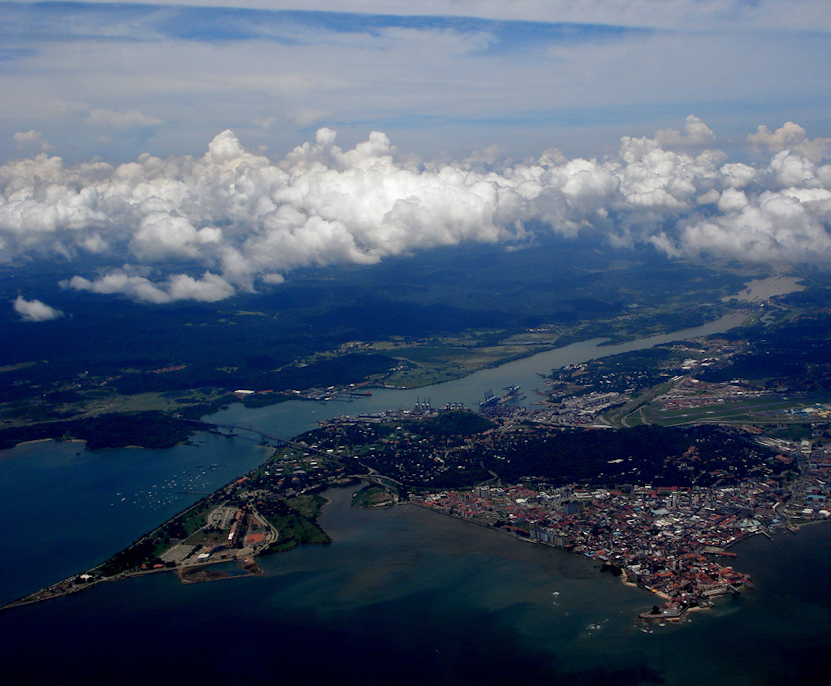About a year ago I casually mentioned the concept of "sacred grounds" in defence policy.
Two examples stand out for this, and a third may qualify:
Switzerland
 |
| Veiew of United Nations European HQ at Geneva by Tom Page |
Saudi Arabia
| The Masjid al-Haram and Kaaba in Mecca by Ariandra 03 |
Panama
 |
| "Panama Canal - Pacific Side Entrance" by Camilo Molina derivative work: MrPanyGoff |
To host something that's of global importance** could add to a country's security and help it a lot in gaining supporters and reducing the list of hostile countries. Maybe this is not an exogenous benefit only, maybe it could intentionally be created and fostered in order to pacify a conflict zone?
S O
defence_and_freedom@gmx.de
.
*: Or unless the aggressor is trusted to not disrupt or risk disruption of canal operations.
**: Not just for sightseeing, but something actually important.
**: Not just for sightseeing, but something actually important.

You need a certain smallness to accomplish this. Germany might be on a level that is slightly too big yet.
ReplyDeleteBut with BRIC growth further down the road of the 21st century, we could become some kind of Switzerland.
Saudi Arabia's oil fields are not on holy ground and there was documented fighting in Mecca.
US and UK are not protected by hosting elite universities.
ReplyDeleteThose universities are of no special importance to other countries...
DeleteThose handful of foreigners (thousands in a world of billions) could easily leave.
DeleteThose universities have no special meaning to foreigner, they are irrelevant on the global scale.
We will find out about Saudi Arabia very soon.
ReplyDeleteThe goal of Muslim extremists has always focused upon establishing a Caliphate, and deposing the house of Saud.
If what is happening in Iraq and Syria is any indication, a full scale religious war from the Mediterranean Sea to the Indian Ocean has started. Forget the side show in Gaza, ISIS executed 5,000 Iraqis just last week.
GAB
It did almost certainly not, for its numbers aren't much greater than that - and almost certainly lower in Iraq.
DeleteBesides, such behaviour would be self-defeating (and they learned this already in Iraq years ago).
"It is incomprehensible that the Iraqi armed forces and federal police were ejected en mass from these provinces without casualties(...)"
DeleteEntirely without casualties is unrealistic, but the casualties did not need to be high.
It's fairly common that military and paramilitary forces are brittle and flee under modest pressure.
Look at the fall of Havana in January 1959, for example.
In northern Iraq, there is dissatisfaction with the Shia gouvernment and a lack of strong local alternatives other than IS. Some reports seem to indicate that numbers were whithering away by high levels of desertion. IS needs just to establish a pressure that enhances desertion.
ReplyDeleteMass executions seem kind of stupid from this perspective, because they strengthen the enemy resolve to fight for their life. There might have been executions for a number of reasons, but the story is also spin doctoring to strengthen the defence. IS calls for highly qualified immigrants could rather highlight that the northern Iraqis try to wheather this storm.This might include armed capabilities for opportune insurrections if IS gets really unpopular.
Excellent point about the desertions, yet ISIS has beat off the Iraqi Army, the IKR Army, an all police forces. They have also been successful in Syria, against the Army, against Hezbollah, and also the Iranian Quds forces.
DeleteISIS now holds the Mosul dam and controls the majority of fresh water in Iraq (which also means they control much of the electricity too).
GAB
I have been thinking about the IS actions and found faults in my logic.
DeleteIraq and Syria have half their population under 18. Over 60% life in an urban environment, making them mobile and available to take up various chances. The soldiers of the Iraqi army and the Peshmerga would most likely be among the young men and women(PKK), who just celebrated their 18th birthday. This is a very young and adaptive environment. Looking at it from gang wars with similar age groups, extreme violence in combination with showing of signs of success can serve as an enticer to tag along. Some of IS former enemies switched sides.
An outsider can make too much of age old structures that do not have as much meaning in a world of youngsters. The very public exterminations serve to break down existing old structures and erect new ones on different lines. Even the Shia-Sunni divide is not set in stone, it can change. Mass murder on POW is a very effective means to celebrate lethality. Young people have a much lower perception of personal risk. That might be a message of risk and resulting fear that does come across and at the same time enhances fighting reputation as "superhumans".
Reported number of combatants for the IS are simply too small to control millions of people in their lands. These numbers might be the core group, but they need a lot more militias to execute their control of conquered populations. The numbers are too small to believe and might be an intentional misinformation to make their success astonishing (God must favour them!) and the capability to join and rise in the ranks seem more realistic options.
Their success on the battlefield will have a lot to do with intelligence collection and superior communication and organization. Longterm, this will set in a trend in the Middle East of military reforms to cope with organizational and training progress. Such advances in management can threaten Israel with much more capable opponents in overwhelming quantity.